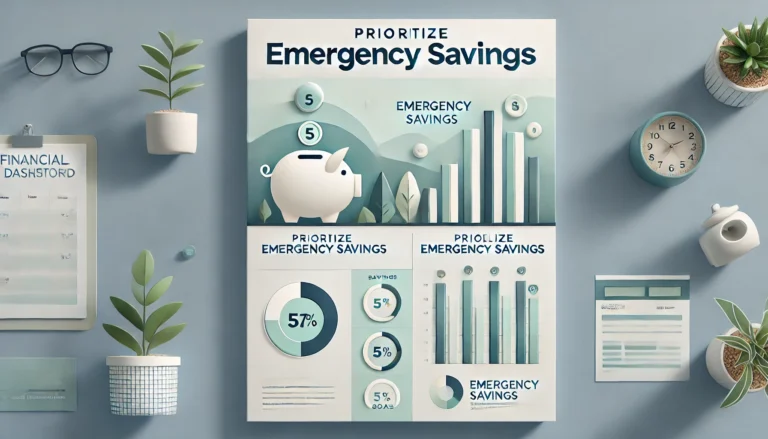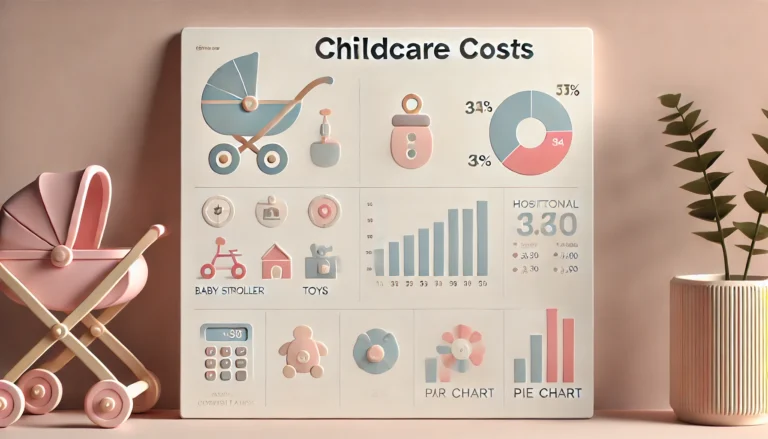How to Manage Your Finances with a Growing Family
Managing finances effectively becomes more critical as your family grows. Raising children, planning for their future, and addressing the increasing daily expenses can put a strain on your budget if you’re unprepared. This article will provide practical steps to help families navigate these challenges, manage their finances well, and achieve long-term financial stability. By organizing your finances, budgeting properly, saving smartly, and preparing for the future, you can keep your family’s financial health in check.
1. Assess Your Current Financial Situation

The first step in managing family finances is to take a comprehensive look at your current financial situation. Understanding your starting point helps you identify areas that need improvement and highlight potential growth opportunities.
Evaluate Your Income and Expenses
Understanding how much money comes in and how much goes out is essential. Start by reviewing all sources of income, such as salaries, side hustles, and investment returns. Then, list out all your monthly expenses, breaking them into essential categories like mortgage or rent, groceries, utilities, and childcare, along with non-essential categories like entertainment or dining out.
A clear understanding of where your money goes allows you to make necessary adjustments to ensure you’re spending in alignment with your priorities.
Analyze Debt and Liabilities
Debt can be a significant obstacle when trying to build financial security. Review all outstanding debts, including credit cards, car loans, mortgages, and student loans. List each debt with its balance, interest rate, and minimum payment.
High-interest debt, like credit cards, should be prioritized for repayment as it can drain your resources if left unchecked. Use the debt avalanche or debt snowball method to strategize paying down your debts, focusing either on interest rates or smaller balances first.
Examine Your Savings
Take a close look at your savings accounts. How much do you have in emergency funds, retirement accounts, and other savings vehicles like education funds? Ideally, your emergency fund should cover three to six months of living expenses in case of unexpected events like job loss or medical emergencies. Your retirement savings should also be in line with your long-term financial goals. If you’re falling short, it’s time to reevaluate your contributions.
2. Develop a Budget that Works for Your Family
Budgeting is the cornerstone of effective financial management. It enables you to plan your spending, track your expenses, and ensure that you are living within your means. As your family grows, so do your financial responsibilities, making a family-focused budget essential.
Set Short-Term and Long-Term Goals
Before setting up a budget, it’s essential to outline your financial goals. Short-term goals may include saving for family vacations, home improvements, or paying off high-interest debt. Long-term goals can range from saving for a down payment on a home to building a college fund for your children and, eventually, retiring comfortably.
With clear goals in mind, your budget will reflect not just daily survival but also purposeful saving and spending towards your aspirations.
Distinguish Between Fixed and Variable Expenses
Fixed expenses are monthly costs that stay relatively consistent, like rent or mortgage payments, car payments, insurance premiums, and utility bills. Variable expenses, on the other hand, fluctuate month to month and include groceries, entertainment, and transportation.
Start by allocating income towards fixed expenses first, then estimate your variable costs. To stay flexible, overestimate your variable expenses slightly to ensure you’re not caught off guard.
Account for Unexpected Expenses
Building some cushion into your budget for unexpected expenses is crucial. This might include medical bills, home repairs, or sudden school costs. Set aside a small amount each month in a “miscellaneous” category or increase your emergency fund to prepare for these occurrences.
Ensure Flexibility
No budget should be rigid. As your family grows, financial demands will change. Perhaps childcare expenses increase as you welcome another child, or maybe your grocery bill fluctuates as your children grow older. Make sure to revisit and adjust your budget regularly to ensure it stays relevant to your family’s evolving needs.
3. Savings Strategies for the Future
As you work on managing daily expenses, it’s crucial to prioritize saving for both near-term needs and long-term goals.
Prioritize Emergency Savings

The uncertainty of life requires that you have a financial cushion in place. Ideally, an emergency fund should cover at least three to six months of living expenses. This fund acts as a financial safety net if you experience a job loss, medical emergency, or significant unplanned expense. Start by saving a small amount each month until you’ve built a sizable buffer. Automating these savings can ensure consistency.
Continue Saving for Retirement
Retirement savings should not be neglected while raising a family. Contributing to a retirement account, such as a 401(k) or IRA, is essential. Even with children in the picture, it’s important to keep in mind that there are fewer financial resources available to people once they retire. Take advantage of employer matching programs if available, and consider increasing contributions gradually.
Save for Children’s Education
The cost of education continues to rise, making it wise to start saving early if you intend to support your children’s college or vocational education. Consider opening a 529 plan, a tax-advantaged savings account specifically for education. Contributing regularly, even in small amounts, will help reduce the burden later.
4. Effectively Managing Debt
Debt is an inevitable part of most families’ financial lives. However, managing it well is crucial to maintaining financial health.
Focus on High-Interest Debt First
Credit cards and other high-interest debts should be tackled first. Pay more than the minimum payment on high-interest accounts to reduce the principal faster and avoid excess interest accumulation. You can use the debt avalanche method to focus on paying off debts with the highest interest rates, which can save you more in the long run.
Debt Consolidation
If juggling multiple debt payments is overwhelming, consider consolidating debts. This could involve taking out a personal loan at a lower interest rate to pay off high-interest debts or transferring balances to a credit card with a 0% introductory interest rate. Debt consolidation can make managing payments simpler and save you money.
Avoid New Unnecessary Debt
While it may seem tempting to use credit cards for major purchases, be cautious about taking on new debt unless absolutely necessary. Where possible, try to save up for significant expenses and rely on cash or debit rather than credit.
5. Plan for Major Family Expenses
Certain expenses tend to grow significantly as your family expands, and planning ahead for these is essential.
Childcare Costs

Childcare is often one of the largest costs for families with young children. Whether you’re considering daycare, a nanny, or after-school care, these costs can quickly add up. Research available options, such as employer-sponsored childcare programs or government subsidies, to reduce the financial burden. Creating a dedicated savings account for childcare can also help mitigate the expense.
Healthcare Expenses
Medical costs can be unpredictable, but they can also be managed with proper planning. Review your healthcare coverage and ensure that your family is adequately insured. Consider opening a Health Savings Account (HSA) if you’re eligible, as these accounts allow you to set aside pre-tax money for medical expenses.
Education Costs for Children
Even before college, educational expenses can take a toll on your budget. From school supplies and extracurricular activities to field trips and private tutoring, education-related expenses can add up quickly. Start saving early by setting aside a portion of your income in a dedicated account for education.
Home and Housing Costs
As your family grows, your housing needs might evolve, whether that means moving to a larger home or making renovations to accommodate a growing family. Start planning and saving for these larger housing expenses in advance, as upgrading your living situation often comes with additional costs such as increased property taxes, utility bills, and maintenance fees.
6. Teach Children Financial Responsibility
Teaching your children about money management early on is one of the best ways to ensure they develop healthy financial habits.
Introduce Basic Financial Concepts
Start by teaching your children basic financial concepts like saving, spending, and earning. Give them a small allowance and encourage them to divide it into savings, spending, and sharing categories. This will teach them the value of money and the importance of balancing these priorities.
Involve Them in Family Budgeting
As your children grow older, include them in some aspects of family budgeting. Show them how you prioritize needs over wants and why certain spending choices are made. Involving children in these conversations helps them understand how to manage their own finances as they grow into adulthood.
Teach the Importance of Saving for the Future
Instill the habit of saving early by encouraging your children to save for something they want rather than giving it to them immediately. Whether it’s a toy or a new gadget, teaching them to save up for bigger goals will help them develop patience and an understanding of long-term financial planning.
7. Reassess Your Financial Plan Regularly
As your family continues to grow, your financial plan will need regular adjustments. Family dynamics and financial priorities shift over time, and it’s important to stay on top of those changes.
Conduct Annual Financial Reviews

Schedule an annual financial review for your family to assess your current budget, savings, debt, and financial goals. Check whether you’re on track to meet your short- and long-term goals and make adjustments where necessary.
Update Savings and Debt Repayment Plans
Life changes, such as the birth of a new child, a job change, or a major purchase, will affect your financial situation. Adjust your savings contributions and debt repayment strategies accordingly to reflect your evolving needs.
Consult with a Financial Advisor
If you’re struggling to balance all the financial demands of a growing family, consider seeking the advice of a professional financial planner. They can help you create a personalized plan that addresses your family’s specific needs and goals, ensuring long-term financial security.
Conclusion
Managing finances with a growing family requires careful planning, disciplined budgeting, and consistent saving. By assessing your financial situation, creating a detailed budget, saving for both short- and long-term goals, and managing debt effectively, you can ensure financial stability for your family. Additionally, teaching your children about money management will set them on the path to financial success. Keep revisiting your financial plan to make necessary adjustments as your family grows and your financial landscape changes.





